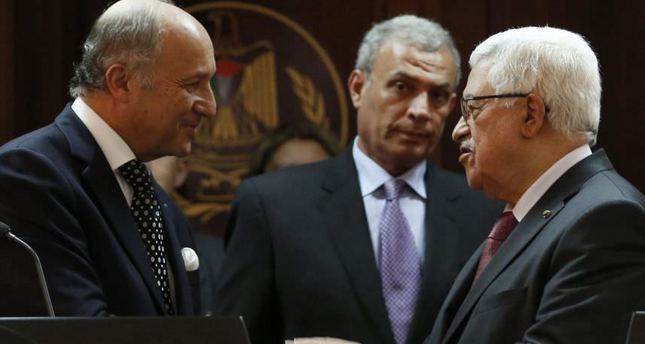
An archive photo from August 24, 2013, shows Palestinian President Mahmoud Abbas, right, and France's Foreign Minister Laurent Fabius shaking hands following their meeting in Ramallah REUTERS PHOTO
REUTERS
JERUSALEM. The proposal on Friday by French Foreign Minister
Laurent Fabius for an international peace conference was the latest sign of
Western frustration over the absence of movement toward a two-state solution
since the collapse of U.S.-brokered negotiations in 2014.
Fabius said that if the French plan did not break the
deadlock, Paris would recognise a Palestinian state.
Such a step would raise concern in Israel that other
European countries, also long opposed to its settlement-building in occupied
territory, would follow suit.
In public remarks to his cabinet, Netanyahu did not
explicitly reject the notion of an international conference - an aide said
Israel would examine such a request once it was received - but he made clear
that reported details of the plan made it a non-starter.
Netanyahu said a "threat" to recognize a
Palestinian state if France's peace efforts did not succeed constituted
"an incentive to the Palestinians to come along and not compromise".
"I assess that there will be a sobering up regarding
this matter," Netanyahu added. "In any event, we will make effort so
that there is a sobering up here, and our position is very clear: We are
prepared to enter direct negotiation without preconditions and without dictated
terms."
On Saturday, Palestinian President Mahmoud Abbas welcomed
the French proposal, telling an African summit in Ethiopia that "the
status quo cannot continue".
But Washington responded with caution to the French move,
saying it continued to prefer that Israel and the Palestinians reach an
agreement on final-status issues through direct talks.
While aware the initiative may struggle to get off the
ground, French officials said Paris had a responsibility to act now in the face
of ongoing Israeli settlement activity and the prospect of continued diplomatic
inaction as the United States focuses on a presidential election in November.
And, the officials said, Netanyahu had gone a step too far
in accusing U.N. Secretary of State Ban Ki-moon of giving a "tailwind to
terrorism" by laying some of the blame for four months of stabbings and
car rammings by Palestinians at Israel's door. Ban angered Israel by saying
last week that it is "human nature to react to occupation".
The United States, European Union - Israel's closest allies
- have also issued unusually stern criticism of Israel in recent weeks,
reflecting their own frustration with the policies of Netanyahu's right-wing
government.
The criticism, particularly about the settlements, where
some 550,000 Jews live in around 250 communities scattered across the West Bank
and East Jerusalem, has raised Palestinian hopes that world powers might
finally be minded to support a U.N. resolution condemning Israel's policy
outright.
